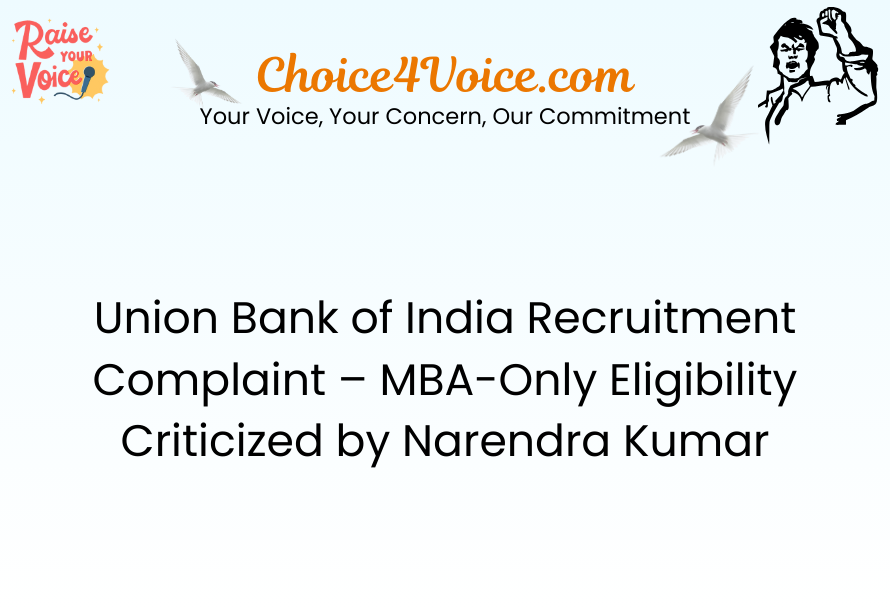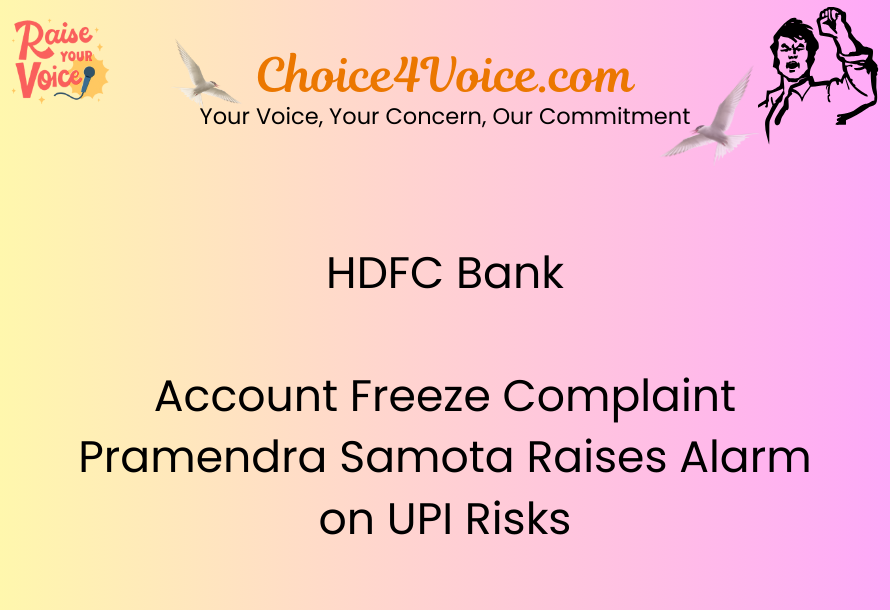If you’re experiencing this problem with this brand or any other company, submit your complaint and we may feature it on Choice4Voice.com.
Submit your complaint →Narendra Kumar highlights unfair eligibility criteria in Union Bank of India’s Wealth Relationship Manager recruitment, urging the bank to include qualified candidates beyond MBA holders.
Complaint Summary Table : Union Bank of India Recruitment MBA-Only Rule Challenged by Narendra Kumar
| Field | Details |
|---|---|
| Complainant Name | Narendra Kumar |
| Designation | MSME Manager |
| Company Concerned | Union Bank of India |
| Department Mentioned | HR Department & Higher Authority |
| Complaint Type | Recruitment Policy Concern |
| Issue Raised | Restrictive eligibility criteria requiring MBA as the only qualification for Wealth Relationship Manager position |
| Complainant’s Demand | Allow candidates with other relevant qualifications and professional experience to apply |
| Impact | Excludes qualified professionals without an MBA, reduces diversity in recruitment |
| Tags Mentioned | #PMO, #MinistryOfFinance |
| Original LinkedIn Post URL | [LinkedIn Post URL] |
Full Write-up
Narendra Kumar, a MSME Manager, has raised concerns regarding the Union Bank of India’s latest recruitment notification for the position of Wealth Relationship Manager.
The notification specifies that only MBA graduates are eligible to apply, which he believes is unfair and unnecessarily restrictive. While the MBA degree is valuable, the exclusion of candidates from other educational backgrounds effectively prevents several highly capable professionals from participating in the recruitment process.
Why This Is a Concern
- Exclusion of Experienced Professionals
Many individuals working in the banking and financial services sector have years of experience and specialized knowledge but may not hold an MBA degree. They are being excluded despite their proven expertise. - Narrowed Talent Pool
By restricting eligibility to MBA holders, Union Bank of India limits itself to a smaller group of applicants, reducing the chances of hiring diverse and highly skilled candidates from other academic and professional backgrounds. - Mismatch with Global Best Practices
Across global banks and financial institutions, qualifications such as CFA, CA, FRM, M.Com, or Economics degrees are considered equally relevant for wealth and relationship management roles. Union Bank’s rigid criteria risk being seen as outdated and non-inclusive.
The Appeal by Narendra Kumar
Narendra Kumar has respectfully urged the HR Department and the senior management of Union Bank of India to review this criterion and allow candidates with other equivalent qualifications or extensive relevant experience to apply.
He has also tagged the Prime Minister’s Office (PMO) and the Ministry of Finance in his LinkedIn post, emphasizing that recruitment policies in public sector banks should uphold inclusivity and fairness, reflecting the government’s larger vision of equal opportunities.
Frequently Asked Questions (FAQs)
1. What is the complaint against Union Bank of India about?
The complaint is about the MBA-only eligibility requirement for Wealth Relationship Manager recruitment, which excludes qualified candidates from other backgrounds.
2. Who raised the complaint?
It was raised by Narendra Kumar, MSME Manager.
3. Which position does this complaint concern?
The post of Wealth Relationship Manager in Union Bank of India.
4. Why is MBA-only eligibility considered unfair?
Because it ignores candidates with other relevant degrees and significant professional experience, leading to exclusion of potentially strong applicants.
5. What other qualifications are relevant for this role?
Degrees like M.Com, CA, CFA, FRM, Economics, or Finance, along with certifications in investment and banking, are highly relevant.
6. How does this restriction affect diversity in hiring?
It narrows the applicant pool, preventing the bank from benefiting from diverse skill sets and perspectives.
7. What skills are essential for a Wealth Relationship Manager?
Key skills include:
- Financial advisory knowledge
- Relationship and trust building
- Investment planning
- Risk assessment
- Communication and negotiation
8. Is an MBA the only path to gain these skills?
No. These skills can also be developed through practical banking experience, professional certifications, or other advanced degrees.
9. What solution has been proposed?
Narendra Kumar requested that Union Bank broaden eligibility criteria to include other degrees and relevant experience.
10. How does this affect experienced bankers without MBA?
It forces them into unnecessary disqualification, even though many may have spent over a decade managing clients and finances.
11. Why did the complainant tag the PMO and Ministry of Finance?
Because Union Bank is a government-owned institution, and he believes recruitment policies must align with national standards of inclusivity.
12. How do global banks recruit for similar roles?
Global banks like HSBC, Citi, and Barclays accept candidates with varied educational and professional qualifications, not only MBA.
13. What risks does Union Bank face with MBA-only hiring?
- Negative public perception
- Loss of qualified candidates
- Criticism for rigid recruitment practices
- Limited scope for talent acquisition
14. Does professional experience hold value in such roles?
Yes. In many cases, experience in client management, wealth advisory, or investment planning can be more impactful than formal education alone.
15. What message does this policy send to non-MBA professionals?
It signals exclusion, creating a barrier for capable professionals who could contribute significantly to the bank’s success.
16. Could this impact the quality of hires?
Yes. By excluding capable candidates, the bank risks missing out on high-performing employees who might outperform MBA graduates.
17. Is this policy common across Indian banks?
Not always. Several banks and financial institutions allow multiple qualification pathways, making Union Bank’s criteria appear unnecessarily narrow.
18. What role should HR play in this issue?
HR should reassess the eligibility rules and adopt a policy that balances both academic credentials and professional experience.
19. How can affected candidates raise their concerns?
They can voice concerns publicly on platforms like LinkedIn, submit grievances to the bank’s HR department, or approach relevant regulatory authorities.
20. Can this issue influence future recruitment policies?
Yes. If public pressure grows, banks may reconsider and create more flexible and inclusive policies in future recruitment drives.
21. What is the expected outcome of this complaint?
Ideally, Union Bank should revise its criteria, recognizing diverse qualifications and ensuring fairness in recruitment.
Final Note
This case highlights the importance of fair and inclusive recruitment practices in India’s leading public sector banks. By broadening eligibility criteria, institutions like Union Bank of India can attract the best talent, regardless of whether they hold an MBA degree or other equivalent qualifications.
If you are facing a similar issue with a company or institution, you can raise your voice through Choice4Voice.com, a consumer-advocacy platform that highlights genuine complaints to ensure they reach the right authorities.



